LaTasha N. Nevada Diggs, Interdisciplinary Poet, Vocalist, Curator
May 1 – September 1, 2016
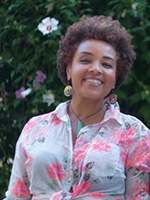 A native Harlem resident, much of LaTasha Diggs’ poetry is embedded with the risks involved with locating social histories in different cultures. In her work she examines Black English, appropriation, code-switching, and language as a source of cultural expression, developing her own global lexicon through the splicing together of multiple languages. In Japan, Diggs will research and develop a collection of flash prose – part memoir and part travelogue – entitled Tuna Melt, which will explore themes and topics relating to the Japanese appropriation of hip-hop culture and house music, misconceptions of identities, the food additive monosodium glutamate, as well as Japanese anime, cinema, photography, and music. She plans to interview poets and musicians, and to also study butoh and taiko drumming.
A native Harlem resident, much of LaTasha Diggs’ poetry is embedded with the risks involved with locating social histories in different cultures. In her work she examines Black English, appropriation, code-switching, and language as a source of cultural expression, developing her own global lexicon through the splicing together of multiple languages. In Japan, Diggs will research and develop a collection of flash prose – part memoir and part travelogue – entitled Tuna Melt, which will explore themes and topics relating to the Japanese appropriation of hip-hop culture and house music, misconceptions of identities, the food additive monosodium glutamate, as well as Japanese anime, cinema, photography, and music. She plans to interview poets and musicians, and to also study butoh and taiko drumming.
Photo: Varni
Alex Dodge, Visual Artist
October 1 – December 31, 2016
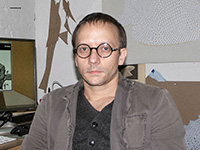 Alex Dodge is a visual artist from Brooklyn, New York, whose work has been known to combine computer code and digital fabrication methods with more traditional media and art making techniques. In recent years, his drawings, works on canvas, and wood sculpture have used computation and computer-assisted tools in combination with the traditional forms, materials, and techniques such as those used by practitioners of miyadaiku, a form of traditional Japanese carpentry involving the use of elaborate wooden joints to construct temples and shrines. In Japan, Dodge plans to travel to Hyogo Prefecture to study with miyadaiku artisans and craftsmen, as well as to visit sites in Kyoto and Nara that are exemplary structures of miyadaiku construction. He plans to later establish a temporary studio in Tokyo to begin working with the materials and tools available to him locally.
Alex Dodge is a visual artist from Brooklyn, New York, whose work has been known to combine computer code and digital fabrication methods with more traditional media and art making techniques. In recent years, his drawings, works on canvas, and wood sculpture have used computation and computer-assisted tools in combination with the traditional forms, materials, and techniques such as those used by practitioners of miyadaiku, a form of traditional Japanese carpentry involving the use of elaborate wooden joints to construct temples and shrines. In Japan, Dodge plans to travel to Hyogo Prefecture to study with miyadaiku artisans and craftsmen, as well as to visit sites in Kyoto and Nara that are exemplary structures of miyadaiku construction. He plans to later establish a temporary studio in Tokyo to begin working with the materials and tools available to him locally.
Graham Kolbeins, Filmmaker
April 1 – September 1, 2016
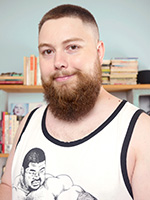 Graham Kolbeins is a queer filmmaker, writer, and designer based in Los Angeles. Over the last few years, his work has engaged in the study and celebration of Japanese LGBTQ art through a variety of media including film, books, and a line of clothing featuring the artworks of gay Japanese artists. He has made three short documentary films on the subject, the latest of which is titled The House of Gay Art. He now plans to develop a feature-length documentary regarding both contemporary and historical manifestations of Japanese LGBTQ life and culture, a project that will also take shape in the form of an online series, gallery exhibitions, and a book of photography including extended interviews. He plans to visit with and document interviews with a wide range of people, including community leaders and activists, artists, politicians, and historians.
Graham Kolbeins is a queer filmmaker, writer, and designer based in Los Angeles. Over the last few years, his work has engaged in the study and celebration of Japanese LGBTQ art through a variety of media including film, books, and a line of clothing featuring the artworks of gay Japanese artists. He has made three short documentary films on the subject, the latest of which is titled The House of Gay Art. He now plans to develop a feature-length documentary regarding both contemporary and historical manifestations of Japanese LGBTQ life and culture, a project that will also take shape in the form of an online series, gallery exhibitions, and a book of photography including extended interviews. He plans to visit with and document interviews with a wide range of people, including community leaders and activists, artists, politicians, and historians.
marksearch (Bruce Douglas & Sue Mark), Interdisciplinary Artists
May 1 – October 1, 2016
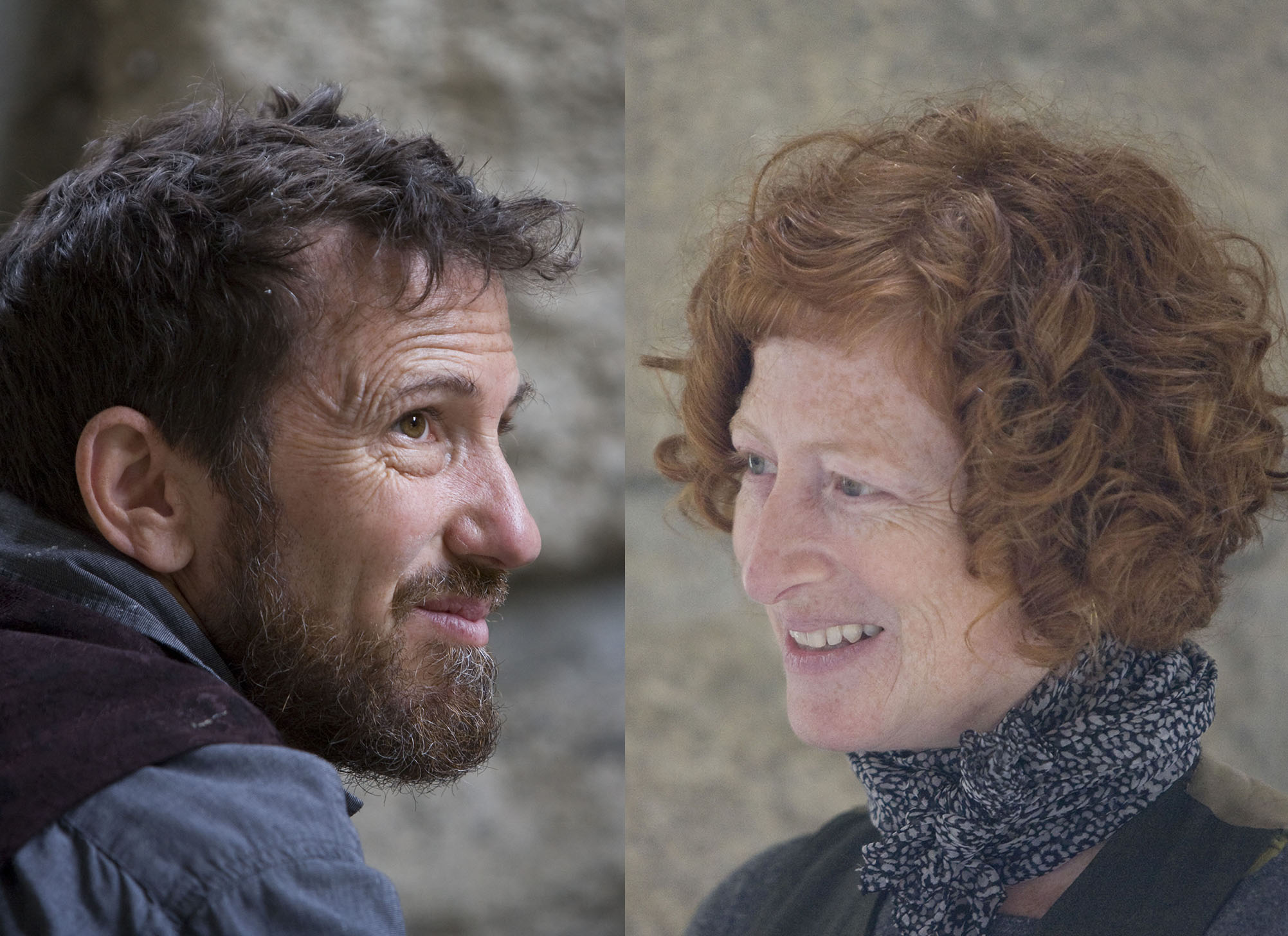 Based in Oakland, California, Bruce Douglas and Sue Mark of marksearch refer to themselves as conversation artists, and as such, they “engage people in collaborative expressions of nearly extinct local history as a way to expose and deepen multi-faceted bonds between people and their environments.” Their art practice is deeply research-based, community-based, and interactive – much of their output is in the form of public projects that intimately engage with the personal histories of the people of a specific community. In Japan, they plan to investigate both the formal and informal methods used to support and sustain the creation of social memory – the collective knowledge of a group over time. Springboarding off of their interest in the mingei (Folk Crafts) movement, they will visit small cities and rural villages to study the ways in which traditional art and life practices have been preserved, or have adapted to change, as well as the effects of rural depopulation, artist-in-residence programs, and the consideration of audiences on the local and global level for such material.
Based in Oakland, California, Bruce Douglas and Sue Mark of marksearch refer to themselves as conversation artists, and as such, they “engage people in collaborative expressions of nearly extinct local history as a way to expose and deepen multi-faceted bonds between people and their environments.” Their art practice is deeply research-based, community-based, and interactive – much of their output is in the form of public projects that intimately engage with the personal histories of the people of a specific community. In Japan, they plan to investigate both the formal and informal methods used to support and sustain the creation of social memory – the collective knowledge of a group over time. Springboarding off of their interest in the mingei (Folk Crafts) movement, they will visit small cities and rural villages to study the ways in which traditional art and life practices have been preserved, or have adapted to change, as well as the effects of rural depopulation, artist-in-residence programs, and the consideration of audiences on the local and global level for such material.
Piper Shepard, Textile Artist
May 1 – August 1, 2016
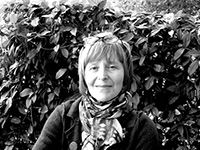 Based in Baltimore, Maryland, Piper Shepard cuts whole cloth into lace-like filigree patterns by hand, creating patterns in the textiles that are at times highly structural and at others, more freely designed. Her work investigates the physical tolerance and qualities of cloth, considering cloth as a skin or membrane, while also considering its ability to sustain, absorb, and hold history and memory. Her large-scale textiles reference architectural elements that act as screens, curtain walls and veils. In Japan, Shepard will study the multiple steps in the creation of a patterned and printed textile, with particular focus on katagami (pattern cutting) and katazome (pattern dyeing) techniques. She plans to travel to Mie prefecture to observe master stencil carvers, Shikoku to study papermaking, indigo dyeing and katazome, and Kyoto to experience dyeing and yuzen (paste resist). In addition to experiencing the various techniques involved, Shepard’s research will also address the history and cultural contexts of these traditional arts.
Based in Baltimore, Maryland, Piper Shepard cuts whole cloth into lace-like filigree patterns by hand, creating patterns in the textiles that are at times highly structural and at others, more freely designed. Her work investigates the physical tolerance and qualities of cloth, considering cloth as a skin or membrane, while also considering its ability to sustain, absorb, and hold history and memory. Her large-scale textiles reference architectural elements that act as screens, curtain walls and veils. In Japan, Shepard will study the multiple steps in the creation of a patterned and printed textile, with particular focus on katagami (pattern cutting) and katazome (pattern dyeing) techniques. She plans to travel to Mie prefecture to observe master stencil carvers, Shikoku to study papermaking, indigo dyeing and katazome, and Kyoto to experience dyeing and yuzen (paste resist). In addition to experiencing the various techniques involved, Shepard’s research will also address the history and cultural contexts of these traditional arts.
For profiles and photos of previous artists, please click on the year
|2018|2017|2016|2015|2014|2013|2012|2011|2010|2009|2008|2007
|2006|2005|2004|2003|2002|2001|2000|1999|1978-1998
|Artists’ Profiles TOP| JAPANESE